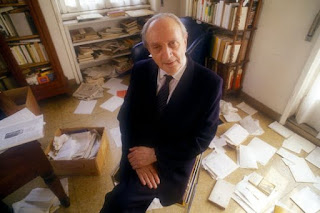 |
| Augusto Del Noce |
When I was working on the second edition a few years ago, I could no longer treat Marxism as moribund, because in a more subtle form it continues to influence the academy and, quite naturally, those educated within its context. The Italian philosopher Augusto Del Noce (1910-1989) saw it coming and predicted its future course. Francis X. Meier writes about Del Noce in yesterday's Wall Street Journal: How Marxism ‘Won’ the War of Ideas. An excerpt:
Del Noce’s real genius was his prophetic insight into the rise of Western irreligion. He saw that Marxism “won” the war of ideas, even as it collapsed as a theory, by establishing the economic dimension of man as humanity’s defining reality. For Del Noce, the West “defeated” Marxism not by reaffirming biblical morality or Christian anthropology but by quietly shedding both. Western countries won by outproducing Marxist systems on their own terms, with material results—superior science, superior technology, more and better consumer goods. The dark side of technology, Del Noce argued, is a passion for “total revolution”—permanent revolution against the past doing business as innovation. The byproducts of its success have been religious agnosticism, sexual liberation and radical secularism. By the time of his death, Del Noce viewed much of Western society, despite its Christian residue, as the most thoroughly atheist in history, a feat achieved not by persecuting God, but by ignoring and rendering him irrelevant.
Jacques Ellul was an earlier profit of this development. Technocracy he identified as the greatest assault on Christ and the kingdom of heaven. Let his voice speak since it speaks out of a personal conviction that no man or god is like HIM. Harmen Boersma
ReplyDeleteThank you, Harmen.
ReplyDelete